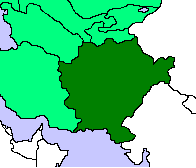H. Dawary
FULL MEMBER

- Joined
- Sep 4, 2019
- Messages
- 565
- Reaction score
- -2
- Country
- Location
A policy maker seeks either to keep power (1)... to increase its power (2)... to demonstrate its power (3). I will come back to these points later.
What do all great powers have in common... (1), A Nuclear arsenal, (2) large territories, (3) sizeable population, and (4) Spheres of influences.
The projected great powers of the future are said to be (1) USA, (2) China, (3) Russia, (4) India, (5) The EU. All these 5 nations (counting EU as one too) have the above 4 mentioned requirements.
Where does Pakistan fit in all of this? Pakistan has two of the above mentioned requirements (1) A nuclear arsenal and (3) A sizeable population, but it is missing (2) and (4). Canada for example, only possesses requirement (2), whereas North Korea only possesses requirement (1), Pakistan in its current state can only hope to be a semi power.
That begs the question as to how Pakistan can fulfil the other two requirements? And what will happen should it not pursue to become a major power?
Pakistan can fulfil requirement (2) by merging with Afghanistan thereby having that large territory, and fulfil requirement (4) by extending its range of influence into the Central Asian republics thereby challenging Russia.
Pakistan in its current state maintains a status quo, which is, seeking to keep power. "Domestic and international politics are by two different manifestations of the same phenomenon: the struggle for power... All nations are either preparing for, actively involved in, or are recovering from violence in the form of war" -Hans... The difference between domestic politics and international politics is separated by the thread of revolution on one hand and war on the other. All nations go through these phases of power struggles within and without.
Pakistan has demonstrated its power in Afghanistan by supporting those parties that are aligned to them of which they share a common interest, which is religion, however it has failed to increase its power due to the reason that it has not adopted those same values of the parties that it supports, which puts it in a quagmire of either keeping power (maintaining status quo) or increasing its power, which is to distribute power to those that are aligned in its policy, much like the Soviet Union which supported the Communist Cuban revolution, and other failed revolution in the Americas such as Grenada and Nicaragua. Unlike the Soviets, Pakistan has not completely adopted its own values for the struggle of power, while it has on the other hand come out as a staunch defender and strong supporter of those values which it supports.
@Pan-Islamic-Pakistan @Slav Defence @Sine Nomine @Ace of Spades @Psychic @Rusty
What do all great powers have in common... (1), A Nuclear arsenal, (2) large territories, (3) sizeable population, and (4) Spheres of influences.
The projected great powers of the future are said to be (1) USA, (2) China, (3) Russia, (4) India, (5) The EU. All these 5 nations (counting EU as one too) have the above 4 mentioned requirements.
Where does Pakistan fit in all of this? Pakistan has two of the above mentioned requirements (1) A nuclear arsenal and (3) A sizeable population, but it is missing (2) and (4). Canada for example, only possesses requirement (2), whereas North Korea only possesses requirement (1), Pakistan in its current state can only hope to be a semi power.
That begs the question as to how Pakistan can fulfil the other two requirements? And what will happen should it not pursue to become a major power?
Pakistan can fulfil requirement (2) by merging with Afghanistan thereby having that large territory, and fulfil requirement (4) by extending its range of influence into the Central Asian republics thereby challenging Russia.
Pakistan in its current state maintains a status quo, which is, seeking to keep power. "Domestic and international politics are by two different manifestations of the same phenomenon: the struggle for power... All nations are either preparing for, actively involved in, or are recovering from violence in the form of war" -Hans... The difference between domestic politics and international politics is separated by the thread of revolution on one hand and war on the other. All nations go through these phases of power struggles within and without.
Pakistan has demonstrated its power in Afghanistan by supporting those parties that are aligned to them of which they share a common interest, which is religion, however it has failed to increase its power due to the reason that it has not adopted those same values of the parties that it supports, which puts it in a quagmire of either keeping power (maintaining status quo) or increasing its power, which is to distribute power to those that are aligned in its policy, much like the Soviet Union which supported the Communist Cuban revolution, and other failed revolution in the Americas such as Grenada and Nicaragua. Unlike the Soviets, Pakistan has not completely adopted its own values for the struggle of power, while it has on the other hand come out as a staunch defender and strong supporter of those values which it supports.
@Pan-Islamic-Pakistan @Slav Defence @Sine Nomine @Ace of Spades @Psychic @Rusty







